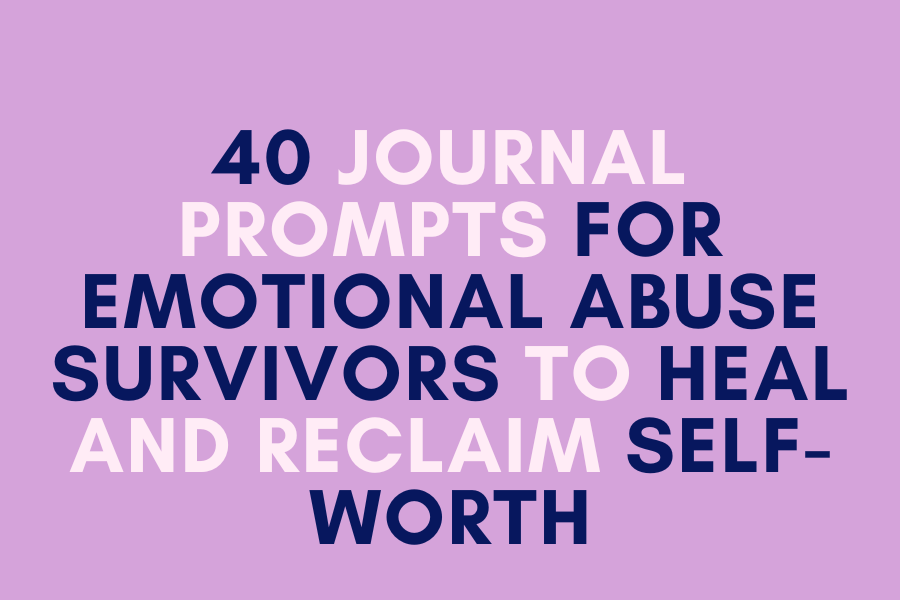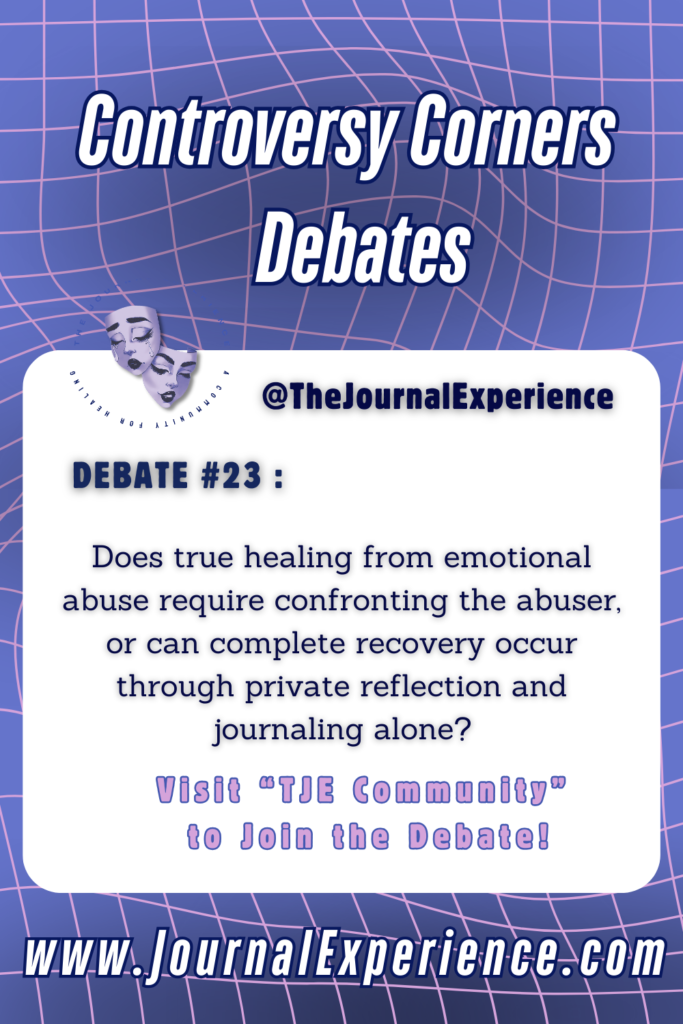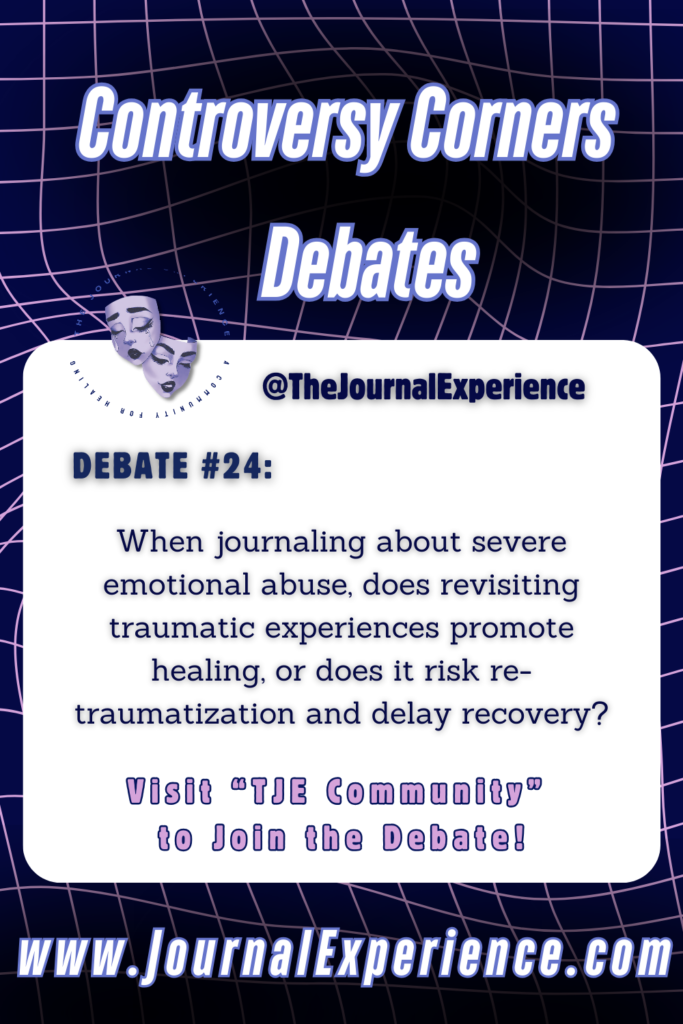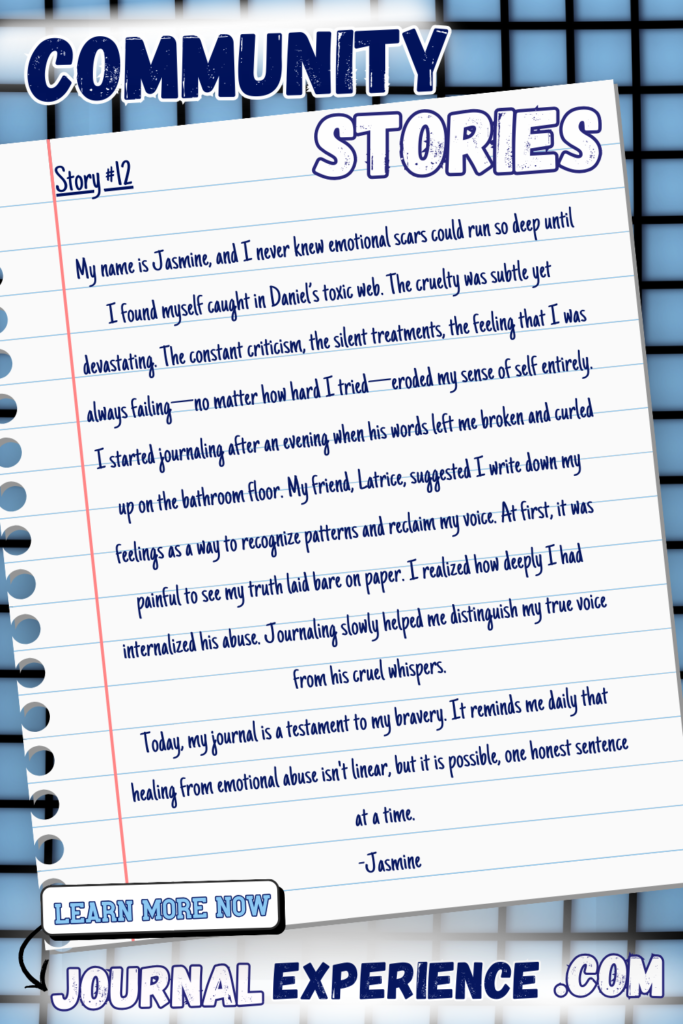Emotional abuse can isolate survivors not just from others, but from their own sense of truth. The confusion and doubt planted during the relationship often linger long after it ends, making it difficult to feel confident in your own reality.

In the aftermath, finding a safe outlet to express those emotions is essential. Journaling becomes more than just writing—it becomes a form of quiet resistance, a way to reclaim your truth and begin rebuilding your inner strength. It gives you the space to name what happened, rediscover your voice, and begin moving toward healing on your own terms. This post offers 40 trauma-informed journal prompts specifically created for emotional abuse survivors seeking clarity, peace, and the return of their self-worth.
Guided Prompts for Emotional Abuse Recovery
Safe Space Prompts for Healing and Reflection
Emotional abuse often includes gaslighting, manipulation, and constant invalidation. Survivors are left doubting their reality and internalizing blame that never belonged to them. These prompts create a safe space to unpack those painful experiences, acknowledge how they affected your sense of self, and begin the process of emotional validation. When you’re finally given permission to believe your pain was real, journaling becomes a powerful tool to piece your identity back together. Writing can gently guide you toward rebuilding the parts of you that were silenced or shattered.
Journal Prompts
- What specific behaviors or patterns made you feel emotionally unsafe in the relationship?
- How were your feelings or experiences minimized or dismissed?
- Describe a moment you now recognize as gaslighting. What made it confusing at the time?
- Write a letter to your abuser that you’ll never send. Say what you couldn’t say then.
- What are some things you wish someone had said to you during those painful moments?
- How did this relationship shape the way you see yourself?
- What messages did you receive about your worth that you now realize were untrue?
- When did you begin to feel like you were “too sensitive” or “always wrong”?
- How has this experience changed your ability to trust your own emotions?
- What would emotional safety look like for you today?
Writing Tip
Let your words come freely—there’s no need to make sense of everything at once. Journaling is your space to be raw, honest, and messy if needed.

Support-Focused Journal Exercises
Healing from emotional abuse is not a journey you have to take alone. Whether you’re reflecting on the support you had—or mourning the support you lacked—this section encourages you to explore your right to seek help, identify emotional allies, and rebuild your inner and outer support systems. Reclaiming your right to receive care and connection is a courageous part of the healing process. Journaling helps you begin identifying where support already exists in your life and where you may need to build it moving forward.
Journal Prompts
- Who has shown up for you in your healing journey, even in small ways?
- How did isolation or lack of support affect your recovery?
- What kind of support do you wish you had during or after the relationship?
- Write a letter to someone you appreciate for being there for you.
- What stops you from asking for help, and how can you challenge that belief?
- What kind of emotional support feels most safe and nourishing to you?
- How do you define “community” in your healing process?
- What boundaries can you put in place to protect your emotional energy now?
- What qualities do you want in the people you choose to lean on moving forward?
- How would it feel to give yourself permission to be supported?
Reflection Exercise
List three ways you can start building or nurturing a safer support system today, whether online, in-person, or within yourself.

Guidelines for Writing About Abuse
Journaling about emotional abuse can bring up intense memories. It’s important to write with awareness and self-compassion. This section provides gentle structure to help you navigate your healing without retraumatizing yourself. Being mindful of your emotional state while writing can help you avoid overwhelm and stay grounded in the present. The goal is not to relive trauma, but to release it in a way that honors your pace and your progress.
Journal Prompts
- What emotions come up when you write about your experience?
- How can you tell when you’ve written too much for one sitting?
- What does it feel like to pause and step back when journaling gets heavy?
- How can you create a journaling ritual that helps you feel emotionally grounded?
- What thoughts or emotions feel too unsafe to write about right now—and how can you honor that?
- Write about a time when writing helped you feel calmer or more in control.
- What signals does your body give when you’re emotionally overwhelmed?
- What coping strategies can you use after journaling difficult memories?
- When is it time to take a break from journaling and seek professional support?
- What would it mean to write your story at your own pace, with no pressure to “get over it”?
Gentle Reminder
You don’t owe your pain a perfect narrative. It’s okay to stop, breathe, or come back later. Your healing is not a performance.
Emotional Healing and Growth Through Journaling
Survivors of emotional abuse often internalize false beliefs about their worth. This final section focuses on rewriting your inner script, celebrating progress, and anchoring yourself in emotional safety. Every small win is a step toward reclaiming who you are. Journaling during this stage helps you practice self-compassion, reestablish trust with yourself, and begin visualizing a future not defined by what you’ve endured but by who you are becoming. Healing isn’t just recovery—it’s the act of remembering your power.
Journal Prompts
- What are three things you’re proud of yourself for surviving?
- What truth about yourself are you starting to believe again?
- How have you grown emotionally since the relationship ended?
- What does healing mean to you right now?
- How can you gently challenge the negative voice in your head?
- What does it feel like to speak to yourself with compassion?
- Write about a moment—no matter how small—where you felt powerful or free.
- What new dreams are you beginning to allow yourself to have?
- What qualities in yourself are you learning to trust again?
- What are you most looking forward to in the next chapter of your life?
Empowerment Exercise
Write a love letter to the version of you that stayed, that survived, and that’s still showing up to heal. Let it be messy, honest, and true.
Overview
Journaling isn’t just a self-care practice—it’s a lifeline for emotional abuse survivors who need a safe place to reclaim their voices. Through writing, you make space for truth, for tenderness, and for transformation.
Let yourself heal in your own time, in your own words. These 40 prompts are just the beginning of that journey. You deserve every moment of peace you’re learning to create. Each entry is a courageous act of coming back to yourself, one sentence at a time. And with every reflection, you strengthen the foundation of the life you’re choosing to rebuild.

Join The Journal Experience community for ongoing prompts, gentle support, and safe spaces to heal out loud. Your story deserves to be heard, and your healing deserves to be honored. Join the community today and find comfort in knowing you don’t have to do it alone.